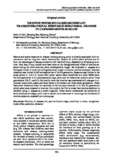Nicotine exposure caused significant transgenerational heritable behavioral changes in Caenorhabditis elegans
Author
Taki, Faten A; Pan, Xiaoping; Zhang, Baohong
Abstract
Passive and active exposure to tobacco smoking among youth is directly associated with immediate as well as long-term health deterioration. Despite all public health policies and efforts, the percentage of teenage smokers is still relatively high, especially in developing countries. Very few, if any, studies have been done on the transgenerational effect of nicotine exposed during the more sensitive, early developmental stages. We employed C. elegans as a biological model to study the multigenerational impact of chronic nicotine exposure. Nicotine treatment was limited to N2 hermaphrodites of the F0 generation. Exposure was limited to the larval period L1-L4 (~31 hours) after which worms were transferred to a fresh NGM plate. N2 hermaphrodites at L4 developmental stage were used for behavioral analysis across three generations: F0, F1, and F2. Our results show that nicotine was associated with changes in sinusoidal locomotion, speed, and body bends in L4 larvae in all three tested generations. These behavioral alterations were not restricted to F0, but were observed in F1 and F2 generations which were never exposed to nicotine. Our study is the first to reveal that nicotine addiction is heritable using C. elegans as a model organism. These results underscored the sensitivity of early development stages, with hope to spread more awareness to encourage the avoidance of nicotine exposure, especially at a young age.
Date
2013-09
Citation:
APA:
Taki, Faten A, & Pan, Xiaoping, & Zhang, Baohong. (September 2013).
Nicotine exposure caused significant transgenerational heritable behavioral changes in Caenorhabditis elegans.
EXCLI Journal,
12(),
793-
806. Retrieved from
http://hdl.handle.net/10342/5474
MLA:
Taki, Faten A, and Pan, Xiaoping, and Zhang, Baohong.
"Nicotine exposure caused significant transgenerational heritable behavioral changes in Caenorhabditis elegans". EXCLI Journal.
12:. (793-806),
September 2013.
May 10, 2024.
http://hdl.handle.net/10342/5474.
Chicago:
Taki, Faten A and Pan, Xiaoping and Zhang, Baohong,
"Nicotine exposure caused significant transgenerational heritable behavioral changes in Caenorhabditis elegans," EXCLI Journal 12, no.
(September 2013),
http://hdl.handle.net/10342/5474 (accessed
May 10, 2024).
AMA:
Taki, Faten A, Pan, Xiaoping, Zhang, Baohong.
Nicotine exposure caused significant transgenerational heritable behavioral changes in Caenorhabditis elegans. EXCLI Journal.
September 2013;
12():
793-806.
http://hdl.handle.net/10342/5474. Accessed
May 10, 2024.
Collections

